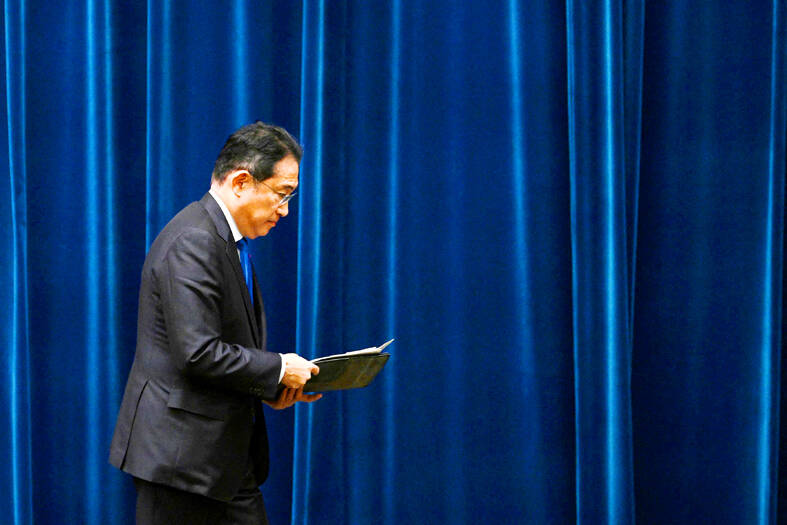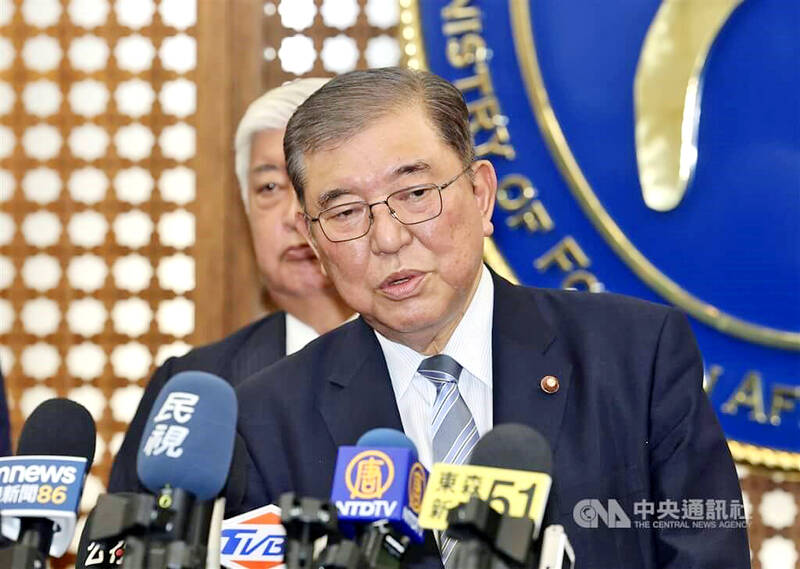Japanese Prime Minister Fumio Kishida yesterday announced that he would not run in next month’s party leadership vote, paving the way for Japan to have a new prime minister.
Kishida was elected president of his governing Liberal Democratic Party (LDP) in 2021 and his three-year term expires next month. Whoever wins the party vote would succeed him as prime minister, as the LDP controls both houses of parliament.
Kishida said that he would support the new leader.

Photo: Reuters
“We need to clearly show an LDP reborn,” Kishida told a news conference. “In order to show a changing LDP, the most obvious first step is for me to bow out.”
“I will not run for the upcoming party leadership election,” he said.
Kishida has faced dwindling support ratings, which have dipped below 20 percent.

Photo: CNA
To achieve policies to tackle difficult situations in and outside Japan, regaining public trust in politics is crucial, Kishida said.
He called on aspiring party lawmakers to raise their hands to run for leadership and debate policies during the campaign.
“Once a new leader is decided, I hope to see everyone unite and form a dream team to achieve politics that can gain public understanding,” he said.
Kishida said he has been mulling his possible resignation for some time but waited until he could put his key policies on track, including an energy policy that calls for a return to nuclear power, a military buildup to deal with security threats in the region, and improving ties with South Korea, as well as political reforms.
Speculation on potential candidates has landed on a number of senior LDP lawmakers, including party Secretary-General Toshimitsu Motegi, Minister of Digital Affairs Taro Kono, Minister of Economic Security Sanae Takaichi and Minister of Foreign Affairs Yoko Kamikawa.
In Taipei, former Japanese minister of defense Shigeru Ishiba said that he is willing to run for prime minister if he gets enough support from the party.
The 67-year-old Ishiba had run for LDP leadership four times before.
Asked if he was interested in running again, Ishiba, who is in Taiwan on a three-day trip, told reporters that he was open to the idea.
Speaking through an interpreter, Ishiba said he would need the support of at least 20 of the 371 LDP members in the two parliamentary chambers to make a run for LDP chief.
Asked if Japan would defend Taiwan if war were to break out in the Taiwan Strait, Ishiba said the top priority for Tokyo was to make sure such a scenario would never happen.
He also said that Japan’s possible responses to a cross-strait conflict were not something that should be shared publicly at a press event.
Ishiba is leading a group of six cross-party Diet members focused on security issues on a visit to Taiwan that was to end later yesterday.
Additional reporting by CNA

CHAOS: Iranians took to the streets playing celebratory music after reports of Khamenei’s death on Saturday, while mourners also gathered in Tehran yesterday Iranian Supreme Leader Ayatollah Ali Khamenei was killed in a major attack on Iran launched by Israel and the US, throwing the future of the Islamic republic into doubt and raising the risk of regional instability. Iranian state television and the state-run IRNA news agency announced the 86-year-old’s death early yesterday. US President Donald Trump said it gave Iranians their “greatest chance” to “take back” their country. The announcements came after a joint US and Israeli aerial bombardment that targeted Iranian military and governmental sites. Trump said the “heavy and pinpoint bombing” would continue through the week or as long

TRUST: The KMT said it respected the US’ timing and considerations, and hoped it would continue to honor its commitments to helping Taiwan bolster its defenses and deterrence US President Donald Trump is delaying a multibillion-dollar arms sale to Taiwan to ensure his visit to Beijing is successful, a New York Times report said. The weapons sales package has stalled in the US Department of State, the report said, citing US officials it did not identify. The White House has told agencies not to push forward ahead of Trump’s meeting with Chinese President Xi Jinping (習近平), it said. The two last month held a phone call to discuss trade and geopolitical flashpoints ahead of the summit. Xi raised the Taiwan issue and urged the US to handle arms sales to

BIG SPENDERS: Foreign investors bought the most Taiwan equities since 2005, signaling confidence that an AI boom would continue to benefit chipmakers Taiwan Semiconductor Manufacturing Co’s (TSMC, 台積電) market capitalization swelled to US$2 trillion for the first time following a 4.25 percent rally in its American depositary receipts (ADR) overnight, putting the world’s biggest contract chipmaker sixth on the list of the world’s biggest companies by market capitalization, just behind Amazon.com Inc. The site CompaniesMarketcap.com ranked TSMC ahead of Saudi Aramco and Meta Platforms Inc. The Taiwanese company’s ADRs on Tuesday surged to US$385.75 on the New York Stock Exchange, as strong demand for artificial intelligence (AI) applications led to chip supply constraints and boost revenue growth to record-breaking levels. Each TSMC ADR represents

Pro-democracy media tycoon Jimmy Lai’s (黎智英) fraud conviction and prison sentence were yesterday overturned by a Hong Kong court, in a surprise legal decision that comes soon after Lai was jailed for 20 years on a separate national security charge. Judges Jeremy Poon (潘兆初), Anthea Pang (彭寶琴) and Derek Pang (彭偉昌) said in the judgement that they allowed the appeal from Lai, and another defendant in the case, to proceed, as a lower court judge had “erred.” “The Court of Appeal gave them leave to appeal against their conviction, allowed their appeals, quashed the convictions and set aside the sentences,” the judges